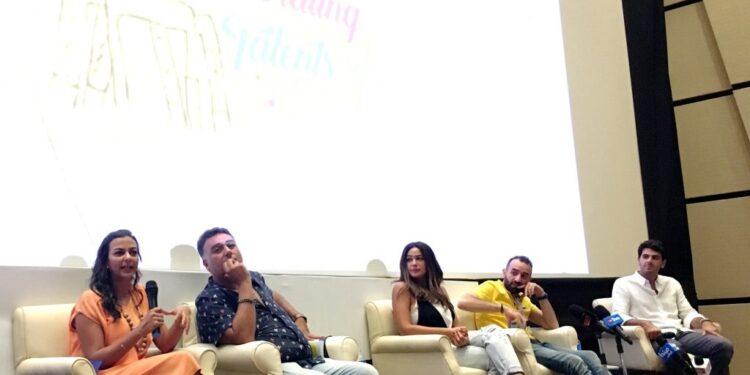

During the first edition of El Gouna Film Festivala competition was organized by society Tayarah. This company, based in Egyptproduces videos, spots and advertisements for the Internet. With his short online videos, his team aims to inspire, educate and entertain. By organizing this competition, Tayarah wanted to offer help and encourage young filmmakers.
The jury composed of the superstar Hend Sabrypresident of Tayarahof the young director Amr Salama, of the screenwriter Tamer Habib, of the director general of TayarahMohammed el-Bassiouni and Yousr Taher, responsible for products and services for Vodafone Egyptselected five finalist screenwriters from more than 700 candidates who applied in ten days.
Each of these five finalists presented his project before the jury and the public. Three prizes were awarded: the production of the film for the winning project, a check for 10,000 Egyptian pounds for the second and a check for 5,000 Egyptian pounds for the third.
It was the young artist and director Adam Abdel Ghaffar who won the first prize with his short film project Shouka We Sekina (Fork and knife), which will therefore be produced by Tayarah.

The presentation of the finalists and the awards ceremony had been preceded by a discussion having the subject of the influence of the Internet on cinema in the Arab world.
It is obvious that today, the Internet as a means of media dissemination has become more and more important in our lives. He changed our habits and allows you to watch movies, videos, series and various shows in a different way.
Speaking, Hend Sabry explained that the first reason that prompted him to take an interest in the digital world is that he will take off in the next ten years in the Arab world, especially in this region 70% of the population under 35 years of age.
The generation between 15 and 35 years old, which is called The Arab Digital Generation (Arabic digital generation) has a certain purchasing power and has a special way of thinking and consuming: it refuses the constraints of places and schedules and also refuses to be unwelcome by advertising.
According to Tamer Habib, the success of the Internet is precisely due to the fact that he gives a certain freedom and allows everyone to look at what he wants as he wishes and at his own pace. Some will look at a soap opera or series in four days, others will spread it over several weeks. In addition, on the Internet, there are no cuts for advertisements.
Yousr Taher has also confirmed that there is a real request to see the soap operas on the Internet, especially during the month of Ramadan. However, there was no service in Egypt for this, a bit like the equivalent of Netflix. This is how Vodafone had thought of creating a platform, Vodafone TVin partnership with professionals, so as to allow spectators to look at their ease the serials that please them while preserving the interests and rights of various professionals.
According to AMR Salama, the Internet will experience a very big boom in the Arab world because young people will be able to express themselves freely what the traditional official media does not allow them to move more and more citizens and their reality. Internet gives the floor to ordinary people, street people and also allows a better discovery of donations and talents.
What are the limits of the Internet?
According to Hend Sabry, there is no limits to the Internet, on the contrary, it is just a product that allows the offer to increase: we open a door next to another door. We offer new options to spectators. Some will only like this Internet product, others will like both and others will remain faithful to cinema and TV. Hend is convinced that the world of the Internet is vast, that we still discover it and that the Arabs are a little late in this sector. She also thinks that Arabs will have to try to improve their internet relationship and are no longer limited to download.
To Tamer Habib, the Internet allows creators greater freedom. And so much the better for all this youth who wants to express themselves. No limit, censorship or other.
This is confirmed by Amr Salama for whom the Internet is backwards censorship. Indeed, it finds very surprising that more and more in our Arab countries, people have become more severe than censorship commissions. In Egypt, sometimes in the street some ask how we let certain scenes pass in the films? Current Arab societies have become more conservative than a few decades ago. For him, the Internet goes against these conservative people, who will have no choice but to let it go.
Tomorrow nobody will be able to exercise any censorship on anything, everyone will be free to look at what they want. We can try to censor and prohibit, but it will be useless. Nowadays, even twelve -year -old kids can use proxys.
In fact, the Internet allows you to look freely and express themselves freely.
The Internet also offers enormous possibilities and above all an extraordinary interactivity with spectators, which allows them to believe they are a work. For example, we can create links with spectators, we can open accounts in social networks to fictitious film characters….

Will the choices and behaviors of users influence the producers regarding the content?
According to Amr Salama, overall, the content will always be the same. As there was through the ages an invention theater, and then radio, cinema and TV inventions, there is today an internet invention. Over time, the principle has not changed, it is always a Story Telling : We tell a story.
What changes is the form and the way of telling. This form which each time evolves and adapts.
For example, before, an episode of a soap is necessarily 45/50 minutes for TV, and an album still included around 13 songs. Today these constraints no longer exist on the Internet.
How could a film made for the Internet, for example for You Tube or Face Book, could it get money? How to put announcements?
For Yousr Taher, it will no longer be necessary to put advertising spots, or we can give the spectators the opportunity to choose. But the most important thing is that in studying customer behavior and their interactions, we can have better statistics and therefore better product placement.
What confirms Amr Salama who says he has noticed that in the USA the professionals are mainly interested in the support used: on which medium do viewers look at a product? For example, the one who watches a film on his TV, only wants to watch without interacting. On the other hand, the one who watches the same film on a tablet or on a mobile phone interacts much more. He thinks that we must develop more interactive products, which will allow an increasingly intelligent product placement. By studying user behavior, you can make more and more targeted and targeted offers. In fact, personalized offers. For him, there lies the future.
Today we want to produce and win immediately. Now would a producer be tempted to produce for the internet and wait long to benefit from it?
For Yousr Taher, just as advertisers who had noticed that people are more and more on their mobiles and tablets, had been forced to take an interest in this sector and today produce spots for Internet, TV and cinema producers, seeing that spectators go to the Internet, will be forced to take the same path.
For Hend Sabry, there are no fears to have, the Internet will on the contrary help cinema, for example before, it was practically impossible to see a short film or an independent film outside festivals or during rare cinema distributions, today we can see them on platforms like Shahid. So ultimately this opens up new horizons to producers, especially for documentaries and short films.
Neïla Driss
Read on the same subject:








